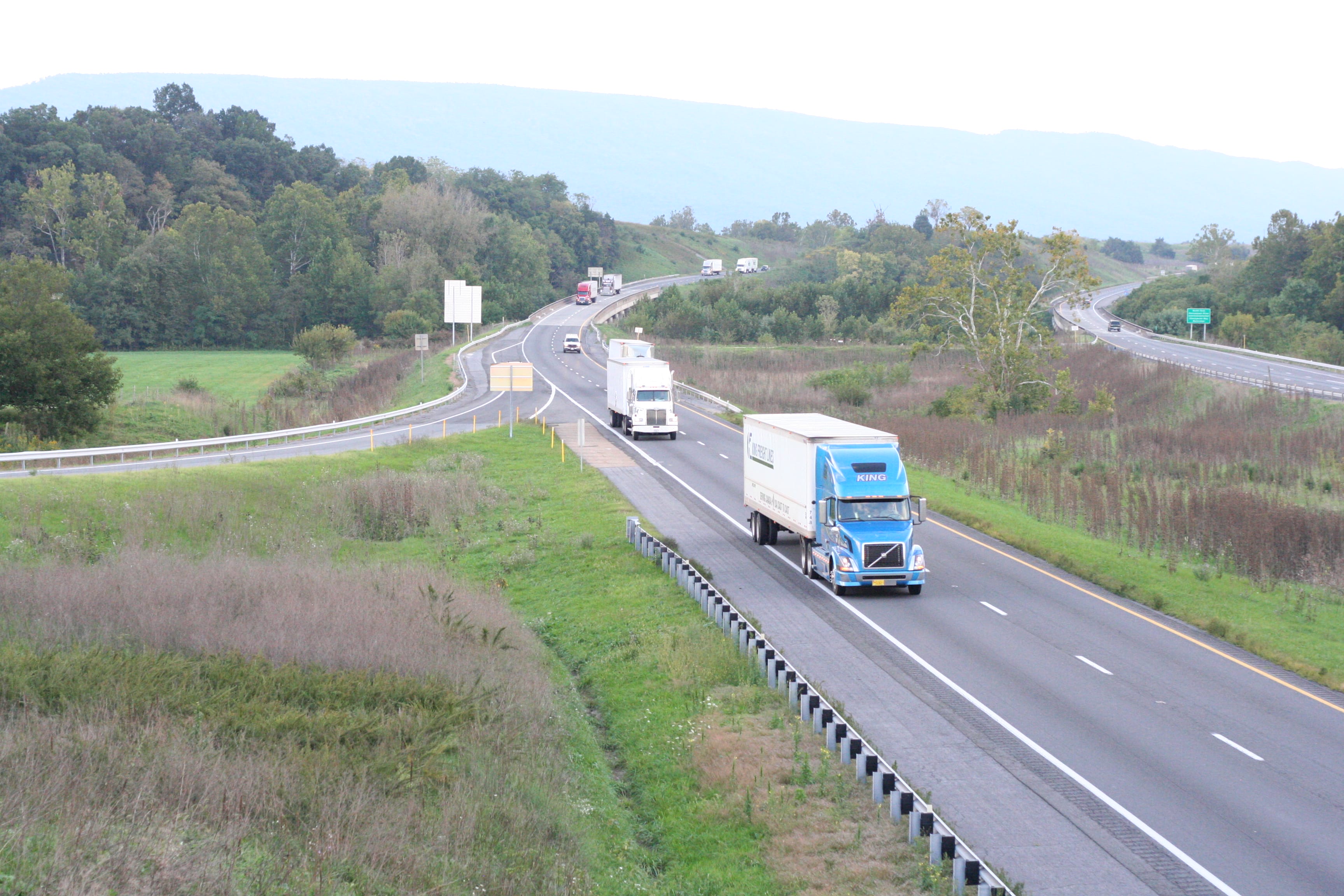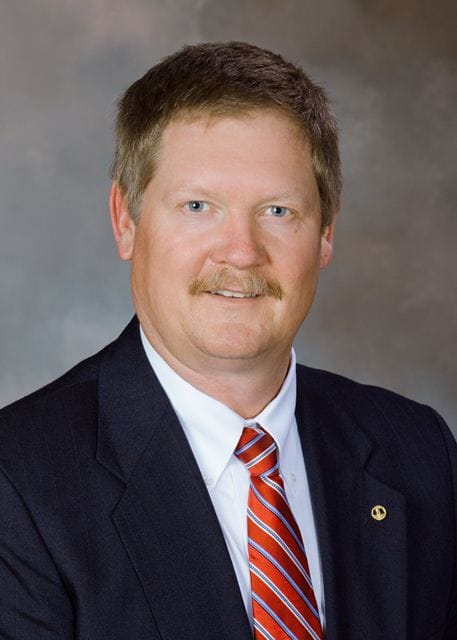
After months of haggling, the General Assembly voted at the last minute this week to fund improvements to I-81 with increased truck registration fees and new fuel taxes.
By Andrew Jenner
Editor’s Note: this story has been updated with comments from Del. Tony Wilt, additional detail about the I-81 funding plan and comment from the Alliance for the Shenandoah Valley.
The road to funding improvements on I-81 took another twist Wednesday, with the General Assembly voting to increase truck registration fees and impose new fuel taxes along the I-81 corridor.
Reconvening in Richmond to consider Gov. Ralph Northam’s vetoes and recommendations, lawmakers approved his plan to pay for $2.2 billion in improvements on I-81 identified last year after lengthy study by the state.
Instead of using tolls to pay for those improvements — as some Valley legislators had proposed earlier this year — Northam’s plan relies on increased fuels taxes and truck registration fees, including a 2.1 percent gasoline tax increase that will take effect along the I-81 corridor this July. That regional tax is expected to increase the price of gasoline by about 7 cents per gallon.
“It definitely is a good outcome. Generally no one likes more taxes and fees, but this is an issue that we’ve looked at for decades,” said Del. Tony Wilt (R-Broadway), who represents Harrisonburg and part of Rockingham County. “It reached a point that people were just fed up and demanding that something be done. That’s the attitude that I took into the General Assembly.”
According to Wilt, the just-passed legislation will fund improvements to I-81 with revenue from:
- A 2.1 percent increase to gasoline taxes in all cities and counties along the I-81 corridor (Planning Districts 3, 4, 5,6 and 7 on this map). All revenue from this new regional gasoline tax, effective this July 1, will be dedicated to I-81.
- A 2.1 percent statewide increase in diesel taxes, effective this July 1. As a statewide tax, revenues will be applied to transportation needs throughout Virginia, primarily along interstate highways.
- Increased truck registration fees, effective this July. Revenues will also be applied to transportation needs across the state, primarily along interstate highways.
- An increase to the road tax that trucks pay under the International Fuel Tax Agreement, roughly equivalent to 10 cents per gallon of fuel used. A first increase takes effect this July, with a second increase effective July 1, 2020.
- An additional 2.03 percent statewide increase to diesel taxes, effective July 1, 2021. After this additional diesel tax increase, revenues will still be applied across the state.
According to numbers released by the governor’s office, these new taxes and fees will generate more than $280 million per year, of which $151 million will be dedicated to improving I-81. That’s on par with the annual revenue needs state planners projected to fund $2 billion in improvements to the interstate.
The House of Delegates approved Northam’s plan by a 58-39 margin, with 12 Republicans joining nearly all Democrats in supporting the measure. The Senate held separate votes on increasing truck registration fees and imposing new fuels taxes. The registration fee amendments were approved by a 25-12 vote, while the new taxes passed on a 22-14 vote.
The Democratic governor’s plan, however, differs considerably from bills introduced earlier this year by Sen. Mark Obenshain (R-Harrisonburg) and Del. Steve Landes (R-Verona). While their initial bills proposed tolling on the interstate and enjoyed the support of Gov. Northam, legislation to that effect never made it to the floor of either chamber for a vote.
When the regular session wrapped up in late February, the legislature had voted to spend another year studying funding options for the interstate — an outcome that Obenshain called “deeply disappointing.”

Del. Tony Wilt
At the time, Wilt also expressed disappointment that no agreement on funding had been reached. At a town hall event organized by JMU last week, however, he hinted that a last-minute change was possible.
“We also tried to deal with I-81,” he said. “We didn’t get anywhere, but I can tell you we’re getting ready to go back to the veto session. Time is not over. I’m still looking into it. I’ll leave it at that.”
Wilt was among the Republicans who voted for the governor’s plan.
“At the end of the day, we got something that’s going to be positive along the 81 corridor and all of Virginia,” Wilt told The Citizen. “It made it a really fulfilling session. We got a lot of good things done, and this was definitely one of them. For me, it rose to the top of our achievements this year.”

Sen. Mark Obenshain
On Wednesday, Obenshain voted to increase truck registration fees, but against the new fuels taxes.
Obenshain could not be reached for comment.
Other Valley legislators voted both ways on the new funding bill. House Majority Leader Del. Todd Gilbert (R-Woodstock), whose district includes part of northern Rockingham County, voted against the measure, as did Landes, one of the original patrons of the tolling bill, and Del. Rob Bell (R-Charlottesville). Landes’s and Bell’s districts both include portions of Rockingham County. Del. Dickie Bell (R-Staunton) joined Wilt in supporting the governor’s plan.
While Obenshain split his votes – supporting increased truck registration fees but opposing new fuels taxes – Sen. Emmett Hanger (R-Mount Solon), who represents Augusta and parts of Rockingham counties, opposed both measures.
Prior to this week’s vote in Richmond, The Alliance for the Shenandoah Valley, which works to preserve the region’s natural resources and rural character and has long been involved in transportation policy, raised concerns about the governor’s I-81 plan.
“These amendments dramatically change the original legislation, with no opportunity for the public or the legislators who represent them to be involved,” the group wrote, in a statement sent to legislators. “The roll-out of the amendments by the Governor’s office leaves the impression that only narrow interests—the trucking industry and roadbuilders—were involved in deliberations. If true, the process falls far short of what should be expected for such consequential policy changes.”
“We are concerned that the Governor’s version of the legislation does not turn off the funding tap once the project list in the I-81 Plan is completed. Creating a permanent funding mechanism will provide ready funding for future projects – good or bad – with minimal accountability,” the statement continued. “A lack of transparency and accountability show that this legislation needs much more discussion before implementation.”
Journalism is changing, and that’s why The Citizen is here. We’re independent. We’re local. We pay our contributors, and the money you give goes directly to the reporting. No overhead. No printing costs. Just facts, stories and context. Thanks for your support.













